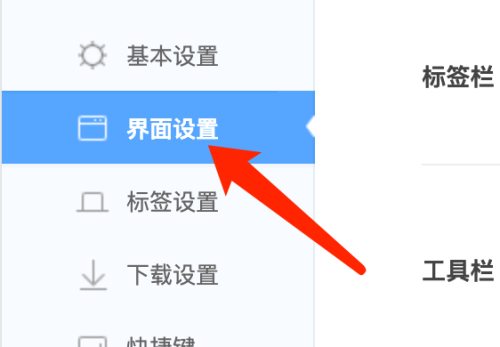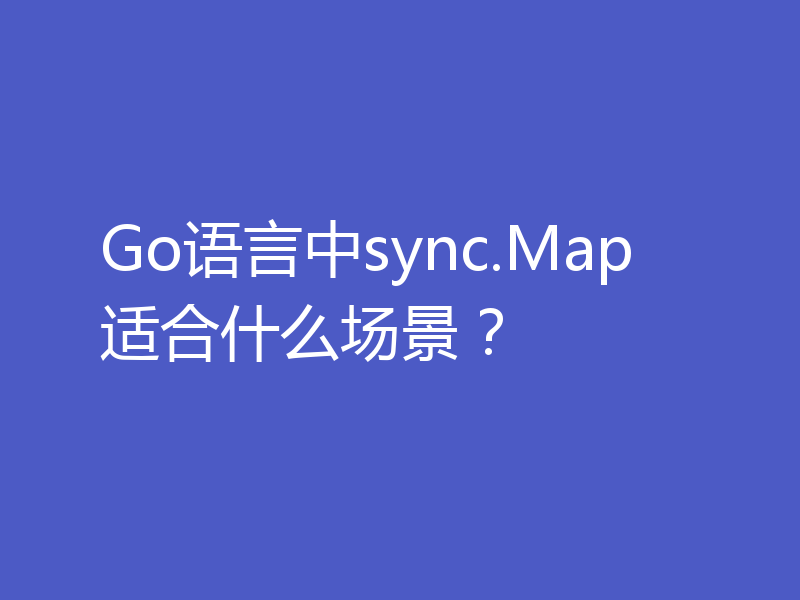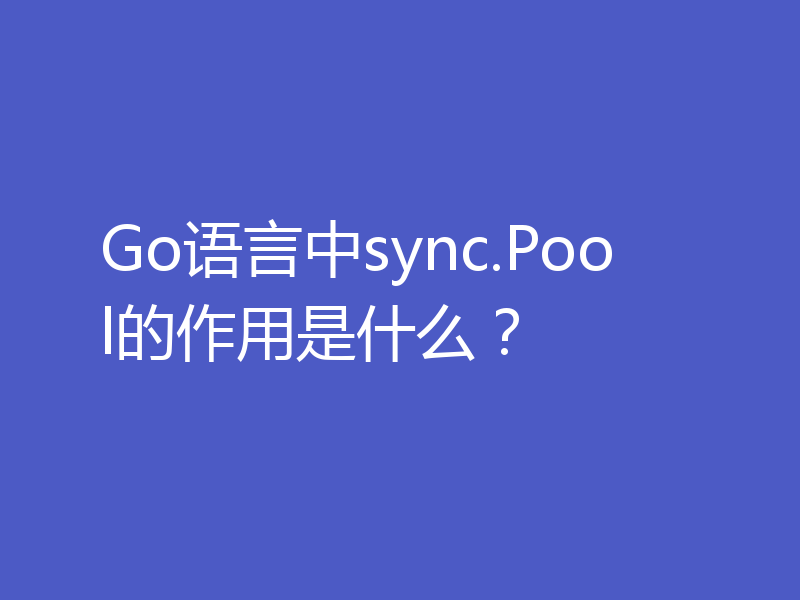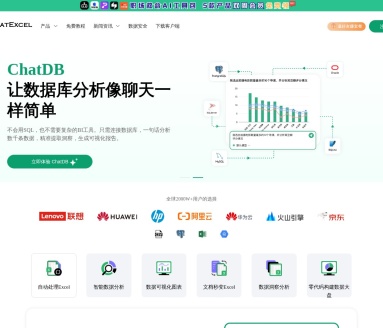Docker 容器中 Golang 可执行文件为什么会在启动后立即挂起?
在 Docker 容器中,使用 Golang 构建的可执行文件在启动后立即挂起的原因通常是由于以下原因: * 可执行文件没有显式打印换行符,导致缓冲区不刷新。 * 可执行文件在容器内部进行网络请求时使用了不正确的 URL,因为它指向的是本地主机,而不是运行容器的主机。
我目前正在 macos 上使用 golang 开发一个小型应用程序,它在本地运行得很好。
我从头开始制作的 dockerfile 制作了一个 docker 映像。
我的问题是,当容器启动时,它会无限期地挂起,docker 不会绑定端口,但我仍然可以进入容器内部。
以下是容器内正在运行的进程:
/go/src/app # ps
pid user time command
1 root 0:00 ./main
13 root 0:00 sh
23 root 0:00 ps
这是我的 docker-compose:
version: "3.3"
services:
dns:
build:
context: .
ports:
- "53:53"
这是我的 dokerfile
from golang:alpine run apk add git workdir /go/src/app copy . . run go get -d -v run go build main.go run chmod +x main expose 53/udp expose 53/tcp cmd ["./main"]
来自 docker 尝试启动容器的日志:
building dns
step 1/10 : from golang:alpine
---> 813e7bfc1890
step 2/10 : run apk add git
---> using cache
---> b796ecde3d09
step 3/10 : workdir /go/src/app
---> using cache
---> cf5226146d6c
step 4/10 : copy . .
---> e5fd26e9ade8
step 5/10 : run go get -d -v
---> running in ac4c1fe7dd41
github.com/gojektech/heimdall (download)
github.com/gojektech/valkyrie (download)
github.com/pkg/errors (download)
github.com/stretchr/testify (download)
github.com/davecgh/go-spew (download)
github.com/pmezard/go-difflib (download)
github.com/stretchr/objx (download)
get "gopkg.in/yaml.v3": found meta tag get.metaimport{prefix:"gopkg.in/yaml.v3", vcs:"git", reporoot:"https://gopkg.in/yaml.v3"} at //gopkg.in/yaml.v3?go-get=1
gopkg.in/yaml.v3 (download)
github.com/miekg/dns (download)
get "golang.org/x/crypto/ed25519": found meta tag get.metaimport{prefix:"golang.org/x/crypto", vcs:"git", reporoot:"https://go.googlesource.com/crypto"} at //golang.org/x/crypto/ed25519?go-get=1
get "golang.org/x/crypto/ed25519": verifying non-authoritative meta tag
golang.org/x/crypto (download)
get "golang.org/x/net/ipv4": found meta tag get.metaimport{prefix:"golang.org/x/net", vcs:"git", reporoot:"https://go.googlesource.com/net"} at //golang.org/x/net/ipv4?go-get=1
get "golang.org/x/net/ipv4": verifying non-authoritative meta tag
golang.org/x/net (download)
get "golang.org/x/sys/unix": found meta tag get.metaimport{prefix:"golang.org/x/sys", vcs:"git", reporoot:"https://go.googlesource.com/sys"} at //golang.org/x/sys/unix?go-get=1
get "golang.org/x/sys/unix": verifying non-authoritative meta tag
golang.org/x/sys (download)
get "golang.org/x/net/ipv6": found meta tag get.metaimport{prefix:"golang.org/x/net", vcs:"git", reporoot:"https://go.googlesource.com/net"} at //golang.org/x/net/ipv6?go-get=1
get "golang.org/x/net/ipv6": verifying non-authoritative meta tag
removing intermediate container ac4c1fe7dd41
---> b9d7f7dfbd1a
step 6/10 : run cgo_enabled=0 go build main.go
---> running in f1e34c2b4ff5
removing intermediate container f1e34c2b4ff5
---> 948947d5834f
step 7/10 : run chmod +x main
---> running in f747d80c1784
removing intermediate container f747d80c1784
---> 48d77cb64ede
step 8/10 : expose 53/udp
---> running in 154f55021335
removing intermediate container 154f55021335
---> 43fec258b5b7
step 9/10 : expose 53/tcp
---> running in 793767d87201
removing intermediate container 793767d87201
---> 5304e6d90c07
step 10/10 : cmd ["./main"]
---> running in 0d6644f390d2
removing intermediate container 0d6644f390d2
---> 7fc32c2c2e27
successfully built 7fc32c2c2e27
successfully tagged lighthouse_dns:latest
recreating lighthouse_dns_1 ... done
attaching to lighthouse_dns_1
它永远挂在“正在连接到 lighthouse_dns_1”。
如果我通过执行以下操作从容器手动启动可执行文件:
docker exec -it <container id> /bin/sh /go/src/app# ./main
这是项目结构:
.
└── project
├── main.go
└── vendor
└── services
├── dns.go
└── request.go
这是代码:
main.go(根文件夹)
package main
import (
"flag"
"fmt"
"services"
)
func main() {
dnsport := flag.int("port", 53, "exposed running port")
flag.parse()
fmt.print("starting server")
dnsservice := services.service{
port: *dnsport,
accesskey: "hot-dog",
}
dnsservice.launch()
}
dns.go(供应商/服务文件夹)
package services
import (
"log"
"net"
"strconv"
"github.com/miekg/dns"
)
type u struct {
accesskey string
}
// servedns ...
func (service *u) servedns(w dns.responsewriter, r *dns.msg) {
sdk := internalsdk{}
msg := dns.msg{}
msg.setreply(r)
switch r.question[0].qtype {
case dns.typea:
msg.authoritative = true
domain := msg.question[0].name
records, getdomainserror := sdk.getdomainrecordsbytype(domain, dns.typea)
if getdomainserror == nil {
for _, record := range records {
msg.answer = append(msg.answer, &dns.a{
hdr: dns.rr_header{name: domain, rrtype: record.type, class: record.class, ttl: record.ttl},
a: net.parseip(record.data),
})
}
} else {
// todo: log error
}
}
w.writemsg(&msg)
}
type service struct {
port int
accesskey string
}
// launchdnsservice ...
func (service *service) launch() {
// make a new response chan
srv := &dns.server{addr: ":" + strconv.itoa(service.port), net: "udp"}
srv.handler = &u{}
if err := srv.listenandserve(); err != nil {
log.fatalf("failed to set udp listener %s\n", err.error())
}
}
request.go(供应商/服务文件夹)
package services
import (
"encoding/json"
"fmt"
"io/ioutil"
"net/http"
"strings"
"time"
"github.com/gojektech/heimdall/httpclient"
)
type InternalSDK struct {
Timeout uint
Host string
Port uint32
AccessKey string
}
type DomainRecord struct {
Domain string `json:"domain"`
Type uint16 `json:"type"`
Class uint16 `json:"class"`
TTL uint32 `json:"ttl"`
Data string `json:"data"`
}
// New ...
// GetDomainInformations ...
func (call *InternalSDK) GetDomainRecordsByType(domain string, entryType uint16) ([]DomainRecord, error) {
// Use the clients GET method to create and execute the request
url := fmt.Sprintf("http://localhost:3000/dns/domain/%s/type/%d", strings.TrimSuffix(domain, "."), entryType)
timeout := 1000 * time.Millisecond
client := httpclient.NewClient(httpclient.WithHTTPTimeout(timeout))
// Use the clients GET method to create and execute the request
headers := http.Header{}
headers.Add("hug", "hh")
res, err := client.Get(url, headers)
if err != nil {
return nil, err
}
// Heimdall returns the standard *http.Response object
body, err := ioutil.ReadAll(res.Body)
var domainRecord []DomainRecord
json.Unmarshal([]byte(string(body)), &domainRecord)
return domainRecord, nil
}
它有效,一旦我退出容器,它就会终止可执行文件的执行(正常行为)
你们知道为什么吗?
解决方案
我将其部署在自己的环境中,并且服务器已启动并侦听端口 53:
removing intermediate container 9ca44a8e9e1c ---> 50ac6085b9d6 step 10/10 : cmd ["./main"] ---> running in f031cb3bb632 removing intermediate container f031cb3bb632 ---> 61f8a889d84d successfully built 61f8a889d84d successfully tagged test-64451146:latest recreating 64451146_dns_1 ... done $ docker run -it --rm --net container:64451146_dns_1 nicolaka/netshoot bash bash-5.0# ss -lnu state recv-q send-q local address:port peer address:port unconn 0 0 127.0.0.11:45648 0.0.0.0:* unconn 0 0 *:53 *:*
我可以用 nslookup 命中它并挖掘并接收响应。我怀疑您的问题是因为您没有看到 starting server 消息,为此您只需添加换行符。否则,仅当容器停止时才会刷新该缓冲区:
fmt.print("starting server\n")
您会看到的另一个可能的错误是对本地主机的网络请求:
url := fmt.Sprintf("http://localhost:3000/dns/domain/%s/type/%d", strings.TrimSuffix(domain, "."), entryType)
在容器内部,localhost是容器,而不是运行容器的主机。网络在 docker 中是命名空间的,类似于文件系统和 pid 的命名空间。这就是为什么我使用上面的 --net container: 语法来运行具有相同命名空间的第二个容器并查看侦听端口。因此,您需要将 url 更改为可以从容器内部访问的内容,如果这取决于您运行它的位置,那么我经常将其作为变量(cli arg 或环境变量)从容器外部注入,而不是将其硬编码到程序中。
理论要掌握,实操不能落!以上关于《Docker 容器中 Golang 可执行文件为什么会在启动后立即挂起?》的详细介绍,大家都掌握了吧!如果想要继续提升自己的能力,那么就来关注golang学习网公众号吧!
 序列化和反序列化的跨语言实现
序列化和反序列化的跨语言实现
- 上一篇
- 序列化和反序列化的跨语言实现

- 下一篇
- 在Mac上如何打开360浏览器的侧边栏
-

- Golang · Go问答 | 1星期前 | go atomic原理 Go并发安全
- Go语言中atomic包如何保证并发安全?
- 109浏览 收藏
-

- Golang · Go问答 | 1星期前 | go select机制 Go并发原理
- Go语言中select为什么是随机选择?
- 103浏览 收藏
-

- Golang · Go问答 | 1星期前 | Go并发map Go sync.Map
- Go语言中sync.Map适合什么场景?
- 331浏览 收藏
-

- Golang · Go问答 | 1星期前 | Go性能优化 Go sync.Pool Go对象池
- Go语言中sync.Pool的作用是什么?
- 496浏览 收藏
-

- Golang · Go问答 | 1星期前 | go并发管理 Go context机制 Go取消控制
- Go语言中context取消机制是如何实现的?
- 255浏览 收藏
-

- Golang · Go问答 | 1星期前 | Go Mutex原理 Go锁机制
- Go语言中Mutex锁的实现原理是什么?
- 117浏览 收藏
-

- Golang · Go问答 | 1星期前 | Go性能优化 Go GC调优
- Go语言中GC调优有哪些方法?
- 476浏览 收藏
-

- Golang · Go问答 | 1星期前 | go RWMutex go读写锁
- Go语言中RWMutex读写锁机制是什么?
- 122浏览 收藏
-

- Golang · Go问答 | 1星期前 | go并发通信 GEO Go channel原理
- GEO:Go语言中channel底层实现原理是什么?
- 172浏览 收藏
-

- Golang · Go问答 | 1星期前 | GEO Go GMP模型 Go调度原理 goroutine机制
- GEO:Go语言中GMP调度模型是如何实现的?
- 101浏览 收藏
-

- Golang · Go问答 | 1星期前 | go并发控制 Go WaitGroup原理
- Go语言中WaitGroup底层实现原理是什么?
- 241浏览 收藏
-

- 前端进阶之JavaScript设计模式
- 设计模式是开发人员在软件开发过程中面临一般问题时的解决方案,代表了最佳的实践。本课程的主打内容包括JS常见设计模式以及具体应用场景,打造一站式知识长龙服务,适合有JS基础的同学学习。
- 543次学习
-

- GO语言核心编程课程
- 本课程采用真实案例,全面具体可落地,从理论到实践,一步一步将GO核心编程技术、编程思想、底层实现融会贯通,使学习者贴近时代脉搏,做IT互联网时代的弄潮儿。
- 516次学习
-

- 简单聊聊mysql8与网络通信
- 如有问题加微信:Le-studyg;在课程中,我们将首先介绍MySQL8的新特性,包括性能优化、安全增强、新数据类型等,帮助学生快速熟悉MySQL8的最新功能。接着,我们将深入解析MySQL的网络通信机制,包括协议、连接管理、数据传输等,让
- 500次学习
-

- JavaScript正则表达式基础与实战
- 在任何一门编程语言中,正则表达式,都是一项重要的知识,它提供了高效的字符串匹配与捕获机制,可以极大的简化程序设计。
- 487次学习
-

- 从零制作响应式网站—Grid布局
- 本系列教程将展示从零制作一个假想的网络科技公司官网,分为导航,轮播,关于我们,成功案例,服务流程,团队介绍,数据部分,公司动态,底部信息等内容区块。网站整体采用CSSGrid布局,支持响应式,有流畅过渡和展现动画。
- 485次学习
-

- ChatExcel酷表
- ChatExcel酷表是由北京大学团队打造的Excel聊天机器人,用自然语言操控表格,简化数据处理,告别繁琐操作,提升工作效率!适用于学生、上班族及政府人员。
- 4119次使用
-

- Any绘本
- 探索Any绘本(anypicturebook.com/zh),一款开源免费的AI绘本创作工具,基于Google Gemini与Flux AI模型,让您轻松创作个性化绘本。适用于家庭、教育、创作等多种场景,零门槛,高自由度,技术透明,本地可控。
- 4466次使用
-

- 可赞AI
- 可赞AI,AI驱动的办公可视化智能工具,助您轻松实现文本与可视化元素高效转化。无论是智能文档生成、多格式文本解析,还是一键生成专业图表、脑图、知识卡片,可赞AI都能让信息处理更清晰高效。覆盖数据汇报、会议纪要、内容营销等全场景,大幅提升办公效率,降低专业门槛,是您提升工作效率的得力助手。
- 4354次使用
-

- 星月写作
- 星月写作是国内首款聚焦中文网络小说创作的AI辅助工具,解决网文作者从构思到变现的全流程痛点。AI扫榜、专属模板、全链路适配,助力新人快速上手,资深作者效率倍增。
- 5842次使用
-

- MagicLight
- MagicLight.ai是全球首款叙事驱动型AI动画视频创作平台,专注于解决从故事想法到完整动画的全流程痛点。它通过自研AI模型,保障角色、风格、场景高度一致性,让零动画经验者也能高效产出专业级叙事内容。广泛适用于独立创作者、动画工作室、教育机构及企业营销,助您轻松实现创意落地与商业化。
- 4710次使用
-
- GoLand调式动态执行代码
- 2023-01-13 502浏览
-
- 用Nginx反向代理部署go写的网站。
- 2023-01-17 502浏览
-
- Golang取得代码运行时间的问题
- 2023-02-24 501浏览
-
- 请问 go 代码如何实现在代码改动后不需要Ctrl+c,然后重新 go run *.go 文件?
- 2023-01-08 501浏览
-
- 如何从同一个 io.Reader 读取多次
- 2023-04-11 501浏览





